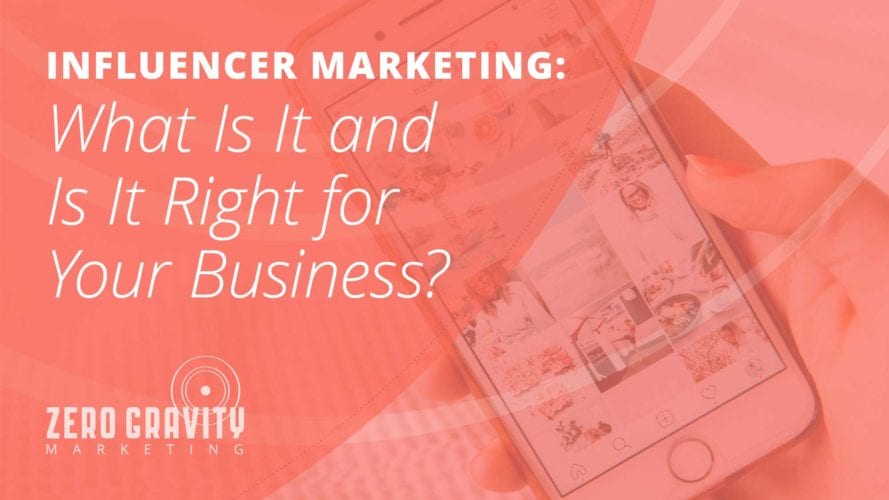Marketing is constantly changing and evolving, with new trends and methods popping up almost every day. One trend that has been gaining significant popularity over the past few years is influencer marketing.
influencer marketing is the use of prominent public figures – also known as influencers – to promote products and brands. These public figures are most often found on social media outlets and exist within virtually every industry (though they are particularly popular in fashion, beauty, and lifestyle space).
What Makes Someone an Influencer?
According to Forbes, influencers have “the power to influence the perception of others or get them to do something different.” This is because they understand the psychology behind buyer behavior, even if they don’t intend to have this knowledge. Through this understanding, they can create the kind of content that audiences want to see – content that is creative, eye-catching, and relatable. This makes them optimal for social media marketing, as they often have tons of loyal followers who hang onto their every word, picture, post, and retweet.
Influencers are most often characterized by:
- Significant Reach – As we’ll discuss later, influencers can have anywhere from 500 to one million or more followers.
- Credibility – Influencers gain their position due in part to their authority in a specific industry. Their followers trust them to have a comprehensive understanding of their field, and thus to provide the best and most trustworthy recommendations and advice.
- Influence – Obviously, to be an influencer, one must be able to sway the opinions of others. One major way influencers do this is by ensuring that their sponsored posts feel authentic. By doing this, they are able to create an experience that feels more like getting advice from a friend – and less like being badgered by a salesman at the mall.
Companies use influence marketers because they provide a direct channel to consumers. Influencer marketing is a lot like receiving a recommendation from a friend – when a product is paired with a familiar face, it is automatically more appealing.
Three Types of Influencer Marketing
The early days of influencer marketing were focused on public figures with massive followings. However, today, this is no longer the case. Influencers no longer need to have hundreds of thousands of followers as long as they can prove that their audience consistently engages with their content. There’s an entire spectrum of influencers, including:
- Micro-influencers – With anywhere from 500 to 10,000 followers, these influencers are typically the most relatable to audiences. They are often local bloggers, creatives, or every-day consumers that see engagement rates of 25 to 50% per post. Their smaller audience allows them to create a more personal relationship with their followers, which translates to trust and loyalty.
- Macro-influencers – These influencers have 10,000 to one million followers and are notable in their industries, whether they’re executives, well-known bloggers, or journalists. They usually see five to 25% engagement and focus on topics that have the highest relevance in trending subjects. Macro-influencers are often found in fashion, business, and lifestyle realms.
- Mega-influencers – These are the big dogs who are household names. Think celebrities, athletes, artists, and social media stars who have found their way to the top of the social sphere. They have at least one million followers and can drive two to five percent engagement. While they have the largest reach out of all types of influencers, this typically translates to the lowest conversion in terms of marketing – due to a more impersonal relationship with audiences.
How to Know if Influencer Marketing is Right for Your Business
Influencer marketing can be an extremely effective approach because it puts your business directly in front of your target audience. However, as with any marketing tactic, it may not be for everyone. Here are some signs that influencer marketing could be beneficial for your business:
- Your Brand is Built Around Social Status – Luxury labels and companies that need to be pursued by the cool kids do well with endorsements from social media influencers. The right people will elevate the perception of a product’s value, situating it as a must-have in elite social circles. This means brand equity — and the associated price tag imparted onto consumers — stays out-of-reach for the average buyer. People who are motivated by instilling envy in their peers or a need to keep up with the Joneses will often be swayed by influencer marketing.
- Your Brand Requires More Trust Than the Average Business – Every company requires a certain amount of trust from its consumers, but some industries need to leverage the power of influencers more than others. If people have to put a lot of thought into the decision to buy the things you’re selling — think cars, parenting products, and health-and-wellness items — they’re likely to pay attention to the things social influencers are saying.
- Your Product Has Mass Appeal – The whole point in pulling on the power of social media influencers is to put more eyes on your products and services. However, that won’t matter if your brand is too niche to appeal to tons of different people. On the other hand, if your company offers items that consumers across various demographics can connect with, a single social influencer can make a world of difference in your marketing efforts.
- You Have a Social Media Presence – Influencer marketing isn’t going to do you much good if you can’t engage with the people who begin to interact with your brand. You can’t rely on your influencers to do all the work for you. Sure, they can boost your brand, but you need to be behind the wheel driving the ultimate success of your strategies. Retweeting, sharing, and getting social are essential pieces to the influencer marketing puzzle.
Looking to grow your company with influencer marketing, but not sure where to start? Zero Gravity Marketing can help. Contact our team of marketing experts today.









